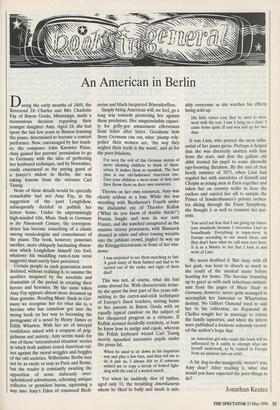An American in Berlin
None of these details would be specially remarkable had not Amy Fay, at the suggestion of the poet Longfellow, subsequently decided to publish her letters home. Under its unpromisingly high-minded title, Music Study in Germany in the Nineteenth Centwy, the correspon- dence has become something of a classic among musicologists and connoisseurs of the piano. The book, however, possesses another, more obliquely fascinating dimen- sion which Longfellow himself (no fool, whatever his twaddling rum-ti-turn verse suggests) must surely have perceived. Certain people in each generation seem destined, without realising it, to assume the qualities imagined by the novelists and dramatists of the period in creating their heroes and heroines. By the same token Amy Fay appears almost more dreamed up than genuine. Reading Music Study in Ger- many we recognise her for what she is, a heroine who has somehow got into the wrong book on her way to becoming the protagonist of a novel by Henry James or Edith Wharton. With her air of intrepid confidence mixed with a soupcon of prig- gishness and naivety, Amy seems made for one of those 'international situation' stories in which both authors tested American val- ues against the moral wriggles and boggles of the old societies. Wilhelmine Berlin may not be as exotic or sexy as Paris and Rome, but the reader is constantly awaiting the apparition of some dubiously over- upholstered adventuress, scheming antique collector or penniless baron, squirming a way into Amy's Eden of rosewood Bech- steins and black-lacquered BOsendorffers.
Simply being American will, we feel, go a long way towards protecting her against these predators. Her unquenchable capaci- ty for golly-gee amazement effervesces from letter after letter. Goodness how those Germans can eat, what 'plump roly- polies their women are, 'the way they neglect their teeth is the worst', and as for the poor frauleins,
I've seen the evil of this German system of never allowing children to think of them- selves. It makes them so mawkish. The best plan is our old-fashioned American one: Give your children a stem sense of duty and then throw them on their own resources.
Thrown on her own resources, Amy was clearly seldom at a loss. While she was wrestling with Beethoven's Fourth under the disdainful eye of Theodor Kullak ('What do you know of double thirds?') Prussia fought and won its war with France, and she watched enraptured as the massive victory procession, with Bismarck dressed in white and silver tossing wreaths into the jubilant crowd, jingled its way up the Koniggratzerstrasse in front of her win- dows: I was surprised to see them marching so fast. A good many of them fainted and had to be carried out of the ranks, and eight of them died!
This was not, of course, what she had come abroad for. With characteristic tenac- ity she spent the best part of five years sub- mitting to the carrot-and-stick techniques of Europe's finest teachers, writing home to her parents in Bayou Goula with an equally typical candour on the subject of her chequered progress as a virtuoso. If Kullak seemed decidedly crotchety, at least he knew how to nudge and cajole, whereas the Polish keyboard wizard Carl Tausig merely squashed successive pupils under the piano lid.
When he used to sit down in his impatient way and play a few bars, and then tell me to do it just so, I always felt as if someone wished me to copy a streak of forked light- ning with the end of a wetted match.
Yet when he suddenly dies of typhus, aged only 31, the trembling Amerikanerin whom he liked to bully and insult is suit- ably overcome as she watches his effects being sold up.
His little velvet coat that he used to wear went with the rest. I saw it lying on a chair. I came home quite ill and was laid up for two days.
It was Liszt, who proved the most influ- ential of her piano gurus. Perhaps it helped that she was discreetly smitten with him from the start, and that the gallant old abbe treated his pupil to some shrewdly ego-boosting flirtation. By the end of that heady summer of 1873, when Liszt had regaled her with anecdotes of himself and Chopin as young men in Paris together and taken her on country walks to hear the cuckoo and carried her off to sample the Prince of Sondershausen's private orches- tra slicing through the Faust Symphony, she thought it as well to reassure her par- ents:
You need not fear that I am giving up Amer- ican standards because I reverence Liszt so boundlessly. Everything is topsy-turvy in Europe according to our moral ideas, and they don't have what we call men over here. It is as a Master in Art that I look at and write of Liszt.
We never doubted it. But Amy, with all her gush, was keen to absorb as much as she could of the musical scene before heading for home. The heroine bouncing up to greet us with such infectious enthusi- asm from the pages of Music Study in Germany, however, never quite managed to accomplish her Jamesian or Whartonian destiny. No Gilbert Osmond tried to add her to his collection, no Raymond de Chelles sought her in marriage to rescue the family tapestries, and when the letters were published a footnote solemnly record- ed the author's hope that
no American girl who reads this book will be influenced by it rashly to attempt what she herself undertook, to be trained in Europe from an amateur into an artist.
A bit dog-in-the-mangerish, weren't you, Amy dear? After reading it, what else would you have expected the poor things to do?
Jonathan Keates


























































 Previous page
Previous page